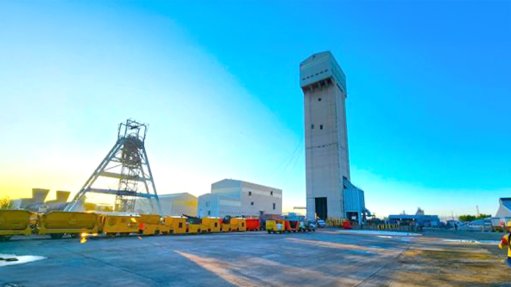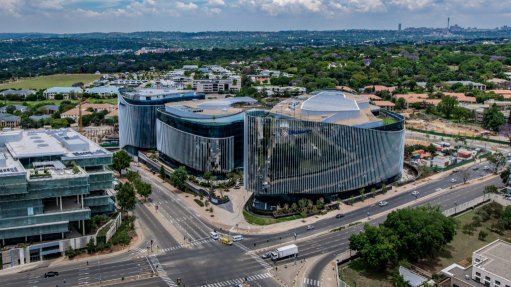Sacci BCI declines to 95.6 in March
The South African Chamber of Commerce and Industry’s (Sacci’s) Business Confidence Index (BCI) declined by 1.3 points to 95.6 in March, with Russia’s invasion of Ukraine having contributed to increased uncertainty.
The index continued on its recovery path following the unrest and disruptions in July 2021 and improved by 2.8 index points between January and February before conceding 1.3 index points in March.
However, the general trend in business confidence during the first few months of this year remained positive, Sacci notes.
“The promotion of investor confidence in South Africa among foreign and domestic investors remains critical and should guide South Africa's approach to global issues,” the organisation says.
The BCI average in the first quarter of this year improved by 2.3 index points quarter-on-quarter to 95.5. This was also 1.2 index points higher than the first quarter of 2021.
“The BCI is currently in a positive trend when compared to the business climate a year ago. Although the Covid-19 pandemic and accompanying economic regulations have subsided, recent geopolitical tensions have increased insecurity.
“As a result, the Sacci BCI is failing to gather the necessary momentum. Regardless, business is still resilient. Between March 2021 and March this year, the BCI increased by 1.6 index points,” the chamber says.
The improved BCI over the previous year is primarily owing to more new-vehicles sold, increased real value of building plans passed and a stronger rand exchange rate, despite higher nominal interest rates and a lower real prime rate than a year ago.
“In the short term, a higher volume of merchandise imports, an increase in the real value of building plans approved and more new-vehicles sold all contribute to an improved business climate.”
The most prominent negative factors that hampered business confidence were higher inflation than in March 2021, lower merchandise export volumes and significantly higher energy prices.
The main subindices that weighed negatively on business confidence in the short term were lower merchandise export volumes, rising interest rates and lower JSE share prices. The high cost of energy, namely fuel and electricity, and the inconsistency of electricity supply contributed to business uncertainty, Sacci notes.
The positive reaction to the relaxation of some of the lockdown regulations contributed to the improvement of the business climate. It has become clear that the State of Disaster and its related Command Council are no longer required, it adds.
However, the global economic volatility caused by the Russia-Ukraine conflict has highlighted some existing domestic economic constraints.
War, sanctions, supply chain disruptions, geopolitics and local socioeconomic unrest are all interfering with economic activity and feeding price volatility, which contributes to and exacerbates commodity and financial market uncertainty and volatility.
“This year could be a watershed moment for the South African economy. Structural economic reforms to increase private fixed investment and a better short-term business climate could all be catalysts for accelerating economic performance and growth.
“This should include changing the public sector's behaviour and attitude, as well as its efficiency and capacity to provide basic government services,” Sacci says.
GLOBAL IMPACT
“The lockdown during the Covid-19 global pandemic posed a threat to global interdependence, and the conflict between Russia and Ukraine has once again exposed the vulnerability of international trade and countries reflecting on the prospects of self-reliance where possible.
“This is putting international trade's comparative advantages under pressure,” the chamber highlights.
Further, the short-term global reaction has been to rapidly return economies to normality post the pandemic, while countries like China enter their own latent lockdown phase.
“The latest geopolitical conflicts should be approached with caution, as the global economy remains vulnerable and susceptible to further disruptions,” the chamber cautions.
South Africa has an open economy with substantial exposure to foreign trade and foreign investment. Import and export volumes and prices across the world continued to be impacted on by extraordinary and unprecedented events over the last three years.
Foreign trade and supply chains were hampered at the height of the Covid-19 pandemic by border and harbour restrictions as a result of lockdowns, while the vulnerability of local supply chains and supply logistics became apparent during the July 2021 unrest.
Concerns and shortages caused by supply chain disruptions caused by the conflict between Russia and Ukraine have recently inflated prices and the availability of strategic products and inputs.
“This eventually will have a negative impact on consumer and business confidence. Russia and Ukraine are major exporters of maize, wheat, fertilizer and key metals, and product prices are impacted on particularly for emerging and developing economies,” Sacci says.
According to the International Monetary Fund, South Africa's two main export destinations are China and the US, with Russia ranking thirty-seventh and Ukraine ranking 101st.
In 2021, South Africa's merchandise exports to the Russian Federation (0.33%) and Ukraine (0.02%) represented 0.35% of total merchandise exports. South Africa has trade deficits with both economies.
Catalytic converters, computers and mechanical appliances (15%), fruit and nuts (21%), and mineral ores (41%) accounted for 76% of exports to Russia. Agriculture accounted for about 5% of total merchandise exports to Ukraine, while mining and manufacturing accounted for 93%.
The direct economic impact may thus be minor, but secondary effects, particularly on crude oil and food prices, may be significant.
Article Enquiry
Email Article
Save Article
Feedback
To advertise email advertising@creamermedia.co.za or click here
Comments
Announcements
What's On
Subscribe to improve your user experience...
Option 1 (equivalent of R125 a month):
Receive a weekly copy of Creamer Media's Engineering News & Mining Weekly magazine
(print copy for those in South Africa and e-magazine for those outside of South Africa)
Receive daily email newsletters
Access to full search results
Access archive of magazine back copies
Access to Projects in Progress
Access to ONE Research Report of your choice in PDF format
Option 2 (equivalent of R375 a month):
All benefits from Option 1
PLUS
Access to Creamer Media's Research Channel Africa for ALL Research Reports, in PDF format, on various industrial and mining sectors
including Electricity; Water; Energy Transition; Hydrogen; Roads, Rail and Ports; Coal; Gold; Platinum; Battery Metals; etc.
Already a subscriber?
Forgotten your password?
Receive weekly copy of Creamer Media's Engineering News & Mining Weekly magazine (print copy for those in South Africa and e-magazine for those outside of South Africa)
➕
Recieve daily email newsletters
➕
Access to full search results
➕
Access archive of magazine back copies
➕
Access to Projects in Progress
➕
Access to ONE Research Report of your choice in PDF format
RESEARCH CHANNEL AFRICA
R4500 (equivalent of R375 a month)
SUBSCRIBEAll benefits from Option 1
➕
Access to Creamer Media's Research Channel Africa for ALL Research Reports on various industrial and mining sectors, in PDF format, including on:
Electricity
➕
Water
➕
Energy Transition
➕
Hydrogen
➕
Roads, Rail and Ports
➕
Coal
➕
Gold
➕
Platinum
➕
Battery Metals
➕
etc.
Receive all benefits from Option 1 or Option 2 delivered to numerous people at your company
➕
Multiple User names and Passwords for simultaneous log-ins
➕
Intranet integration access to all in your organisation


















